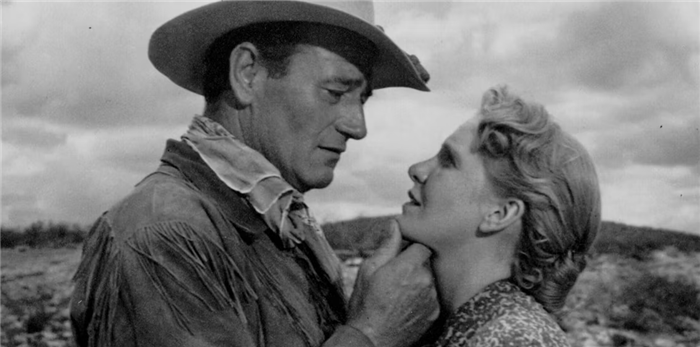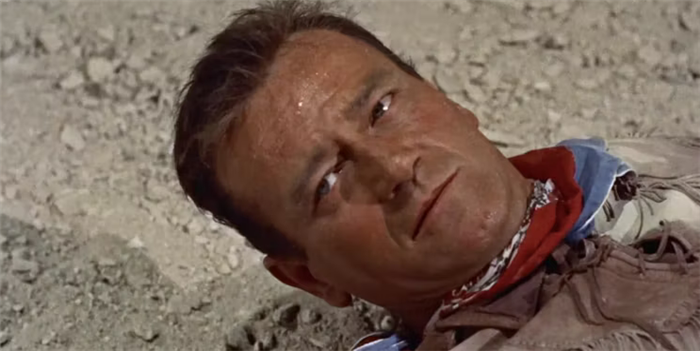1953’s Hondo wasn’t John Wayne’s most successful film, but its legacy has endured thanks in part to the powerful acting and the slightly more sympathetic than usual portrayal of its Indigenous characters. Based on the Louis L’Amour story “The Gift of Cochise,” the film follows a burgeoning love affair between Wayne’s Hondo and a frontierswoman, Angie, played by Geraldine Page, during a time of escalating tensions with the local Apache tribe.
The role was Page’s first official foray onto the silver screen — and after her treatment at the hands of Wayne and director John Farrow, it’s no wonder she waited eight years before attempting another one.
Geraldine Page’s Unconventional Choices May Have Been Purposeful
Was Geraldine Page truly so slovenly and unkempt? There may be more to the story than that. Page accepted the role because she was so impressed with the script, particularly its portrayal of the Apache people. She was famously trained as a method actor, something she spoke about extensively in interviews, like the one she did with the Tulane Drama Review in 1964. In her commitment to her craft, she says, she constantly sought out ways to get inside her characters’ heads, to understand them more completely. Bathing infrequently and eating with her hands would have been simple ways to emulate the life of a pioneer woman eking out a hardscrabble existence in a harsh desert landscape; if it alienated her colleagues, well, perhaps that was simply the cost of her technique.

John Farrow and John Wayne Treated Geraldine Page Poorly on Set
Even aside from the concerns about her teeth, Page’s coworkers were none too kind to her during filming. Wayne constantly mocked the method acting technique, Page’s own inexperience, and theater actors in general to Page’s face. Meanwhile, as Roberts and Olson report, John Ford — who would later take over filming the last few sequences when Farrow had to depart for another film — visited the set and couldn’t help but comment on Page’s appearance, remarking that the audience wouldn’t buy Wayne’s infatuation with a woman so unattractive. (It’s worth noting that at the time of filming, Page was 30 years old, while Wayne was 46 and already as rough and weathered as ever.) The comment sparked Farrow to add a line to Page’s dialogue: “I know I’m a homely woman, but I love you.” Later, according to Roberts and Olson, Wayne’s wife Pilar would write, “it never occurred to Ford, Duke or John Farrow … to consider how she would feel about having to redo the love scene with the additional lines they wanted her to say.”
Despite his verbal abuse, Page herself spoke highly of Wayne later. According to Roberts and Olson, she praised Wayne’s intelligence, sense of humor, honesty, and charismatic leadership, comparing it to Caesar and Napoleon’s ability to attract fanatical followers — though she also acknowledged his faults. In Ronald L. Davis’ biography Duke: The Life and Image of John Wayne, Page talks of Wayne being hungover every morning and taking it out on the crew in “screaming fits,” as well as his bullying behavior toward child actor Lee Aaker.
Roberts and Olson note that Page was also less than impressed by the rest of the cast and crew, who were incessantly sycophantic toward Wayne: “Everybody tried to be Duke’s right-hand man and his favorite. It was like the stories you hear about the old court days. Everybody was trying to slice everybody else’s reputation in the Duke’s eyes. There was tremendous, tremendous competition.”

‘Hondo’ Was a Hit With Audiences
Despite the conflicts on set, Hondo was a hit with audiences. Though it was beaten out at the 1953 box office by another western, George Stevens’ Shane, it was a financial success and became the seventh highest-grossing film of the year. Page earned the film’s only official Academy Award nomination for Best Supporting Actress, a development that shocked Wayne, according to Davis.
Page, of course, would go on to have a long and successful career that lasted until she died in 1987 and garnered multiple Oscar, Emmy, and Tony nominations, as well as an Oscar win for 1985’s The Trip to Bountiful. John Wayne might have had a hard time appreciating her talent, but audiences certainly did not.

Leave a Reply